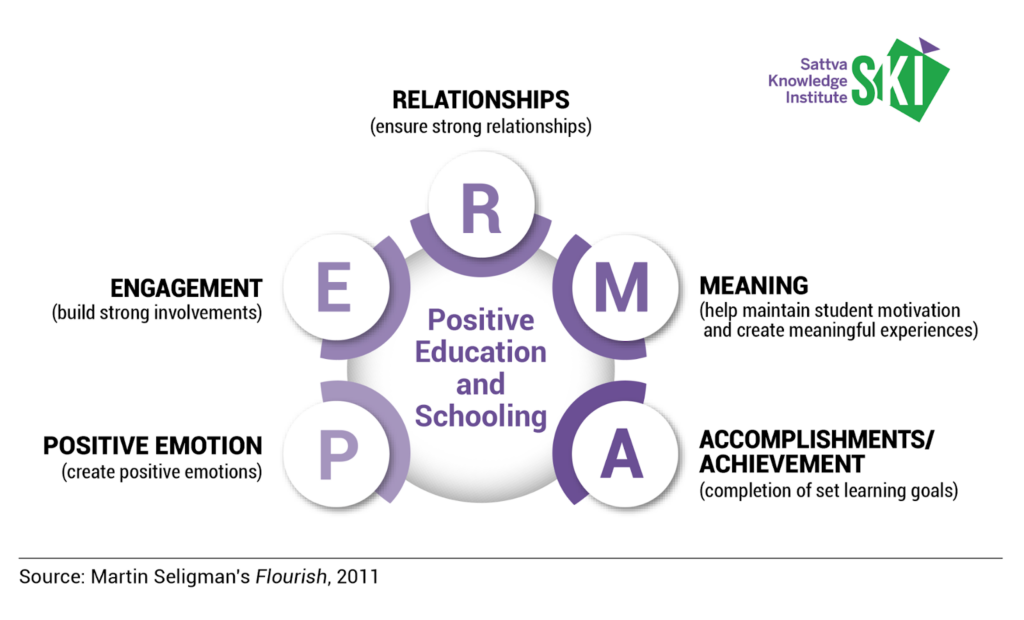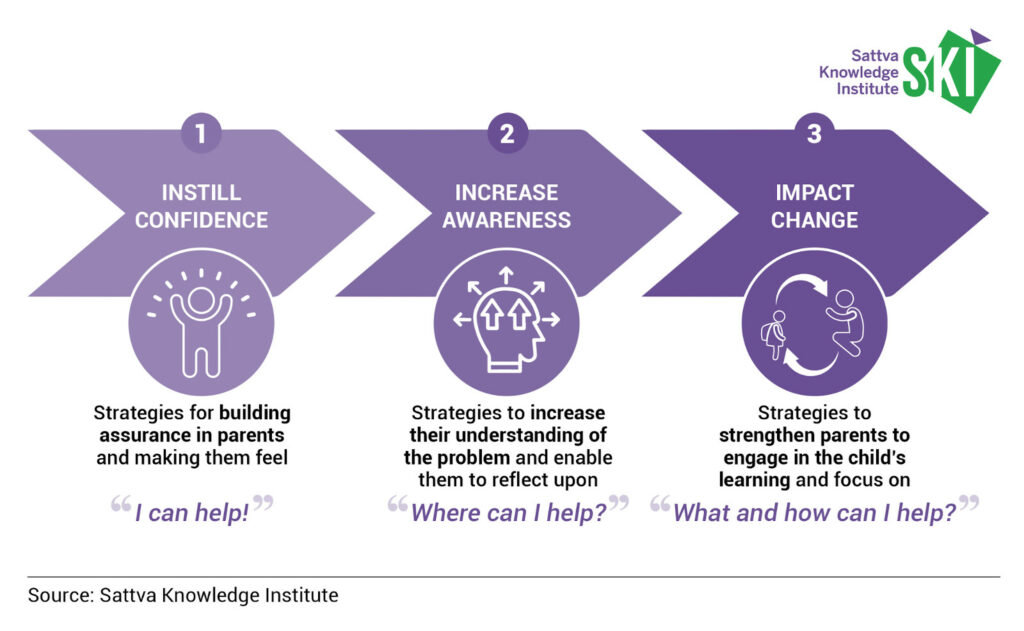Co-Authors: Sreelakshmi S., Shruti Hinge
5 minutes read
India has one of the largest education systems catering to almost 25 crore children. Despite the scope and expanse of interventions, the issue of low learning levels persists. Only 21% of children in grade 3 can read grade 2 text, and only 26% of them can do basic subtraction. As learners progress, they carry these literacy gaps, hindering their progress and potential. These trends in Foundational Literacy and Numeracy (FLN) levels have been similar over the past decade. The occurrence of COVID-19 further impacted the learning crisis in India, which was compounded by poverty shooting from 54% to 70%.
Over the years, the education landscape has focused immensely on understanding and actioning interventions directly impacting students, teachers, and the overall governance structure. For example, organisations like Pratham Education Foundation, Language Learning Foundation, Room-to-Read, Educate Girls, Teach-for-India, and many others have invested in tackling issues like multigrade and multilingual classrooms, the pre-existing learning deficit, and teacher capacity. Organisations like Kaivalya Education Foundation, Samagra, and The Education Alliance are actively working with the government at the state, district, block, and school levels.
Across these interventions, however, the focus has been on developing infrastructure and capacity with reference to skill building. On the other hand, there are only a few examples where the goal is to impact attitudinal changes in adults around the child. These adults comprise teachers, parents, or any other community members enabling the child’s learning at school or at home.
The criticality of programmes emphasising the importance of positive adults in a child’s learning journey comes from a series of studies done, which have proven that when children spend their first 1,000 days in a compassionate and stimulating environment, their brains develop at optimal speed. In Positive Psychology Research 2012, Martin Seligman coined the PERMA model that helps understand the essentials of ‘Positive Education’ and schooling. Here, Seligman highlighted that schools need five elements for enabling children to achieve their full-potential, be happy and succeed in life.

In another study released by the National Bureau of Economic Research, 2020, researchers helped establish a strong link between the focus of schools on student well-being and the positive likelihood of learners completing high-school. Like with teachers, Organisation of Economic Cooperation and Development’s (OECD) work on “The Role of Families in shaping students’ engagement” indicates that parents who share meals with their children and talk to them about school, these children are less likely to skip school and complete high school.
In the Indian context, research conducted by the American Economic Association along with Pratham Education Foundation indicated that mothers who received adult literacy training for language and maths, and were trained to support learning at home in an engaging manner, had an impact on children’s maths scores.
The above evidence bolsters the need for compassionate adults at all stages of the child’s life. With teachers, intervention on attitudinal changes have been initiated by some organisations. For example, through its work at scale with State Governments in Delhi, Punjab, Uttarakhand and Jammu & Kashmir, Simple Education Foundation (SEF)’swork on teacher capacity building in Foundational learning, helps build classrooms as safe spaces, where there is a dedicated time for emotion check-ins, teachers create customised lesson plans, and there is constructive feedback. So far, with this holistic approach, SEF has impacted 1.2 lakh teachers and trained 540 senior government officials to conduct teacher training for creating loving classrooms while achieving FLN outcomes. Along with training teachers in best practices through their modules on ‘building relationships’, SEF also has a set of tools that help look at the impact of these behaviours on learning and help make course corrections.
Another such example is the initiative named PARAM by 321 Education Foundation where they work with schools and communities for three years to support them to achieve sustainable FLN outcomes. While doing so, the first base year is completely invested in establishing the criticality of having vibrant and participatory classrooms.
While there are at least some significant interventions for working with teachers, programmes with parents and community members are very few. Between 2016-2021, India’s education sector received ₹29,918 crores, most of which went into supporting direct interventions by NGOs in classrooms. Moreover, the highest allocation from the Union Budget goes into teacher salaries and training. Furthermore, our analysis of the existing interventions in parent engagement also indicates that the current focus is on the three aspects mentioned below and that more focus is needed on ‘supporting parents with positive and compassionate parenting practices’:
Along with the focus on having compassionate adults however, another deeper question that needs deliberation is “who are we engaging with?” Traditionally, the parent engagement interventions have either focused on mothers or have high participation of mothers. A few examples of these are mentioned below:
- Pratham Education Foundation’s work with mothers’ groups is present across fifteen states in India which has led to creation of 20,000 groups of mothers. These groups have become safe spaces for women to share concerns, support their child’s learning, and focus on their own development.
- Saajha’s parental networks in Delhi have over 1 lakh parents, most of which are mothers
Though engaging with mothers, women, and young girls in the community is of paramount importance, the role of fathers or men in general in the child’s learning is often underestimated. Several studies have indicated that the engagement of fathers in a child’s upbringing has strong associations with positive learning outcomes and lifelong benefits. In this context, research suggests that when fathers bond with their babies from the very beginning of life, it impacts a child’s development, and can lead to better psychological health, self-esteem, and life-satisfaction in the long-term. If fathers are more aware and involved, they are less likely to discriminate between boys and girls and ensure that girls continue to stay in the education net.
However, there are several barriers to roll out programmes centered around engaging fathers or male guardians. Social norms prevent men from assuming equal caring responsibilities at home. The Gender Social Norms Index (GSNI) 2023, which covers 85% of the world population indicates that 46% of people believe that men should have more rights to a job and need to earn more than women. Additionally to see how this translates into fathers involvement, the 2021 report named, ‘The State of World’s Fathers’ report indicated that only 29% men and 27% women from India reported that fathers participate in daily childcare responsibilities.
As India promises to move towards universal achievement of foundational literacy and numeracy by 2026, intentional investments in amplifying programmes for compassionate adults surrounding a child are needed to build a safe, carefree, and joyful learning environment. Moreover, including men in the cadre of caregivers in the formative years of child education is crucial to make education more equitable, just, and such that it keeps the child at the centre.
References
- ASER 2022, Annual Status of Education Report (Rural), 2022, ASER Centre. New Delhi
- Barker, G., Garg, A., Heilman, B., van der Gaag, N., & Mehaffey, R. (2021). State of the World’s Fathers: Structural Solutions to Achieve Equality in Care Work. Washington, DC: Promundo-US.
- Sattva Knowledge Institute (2023), The Role of Parent Engagement in Foundational Literacy and Numeracy Outcomes. June 2023.
- Simple Education Foundation, 2020
- OECD (2013), PISA 2012 Results: Ready to Learn: Students’ Engagement, Drive and Self-Beliefs (Volume III), PISA. OECD Publishing.
- World Bank Press Release 2022, World Bank Press Release, The World Bank. Washington.
- 321 Foundation 2020, PARAM-Our FLN program. New Delhi
- UNDP (2023), Breaking down Gender biases. Shifting Gender Norms towards Gender Equality, Gender Social Norms Index. 2023
- UN Women (2019), Take Five: If Fathers are more aware of Gender Equality, they are more less prone to discriminate between boys and girls, Europe and Central Asia



















